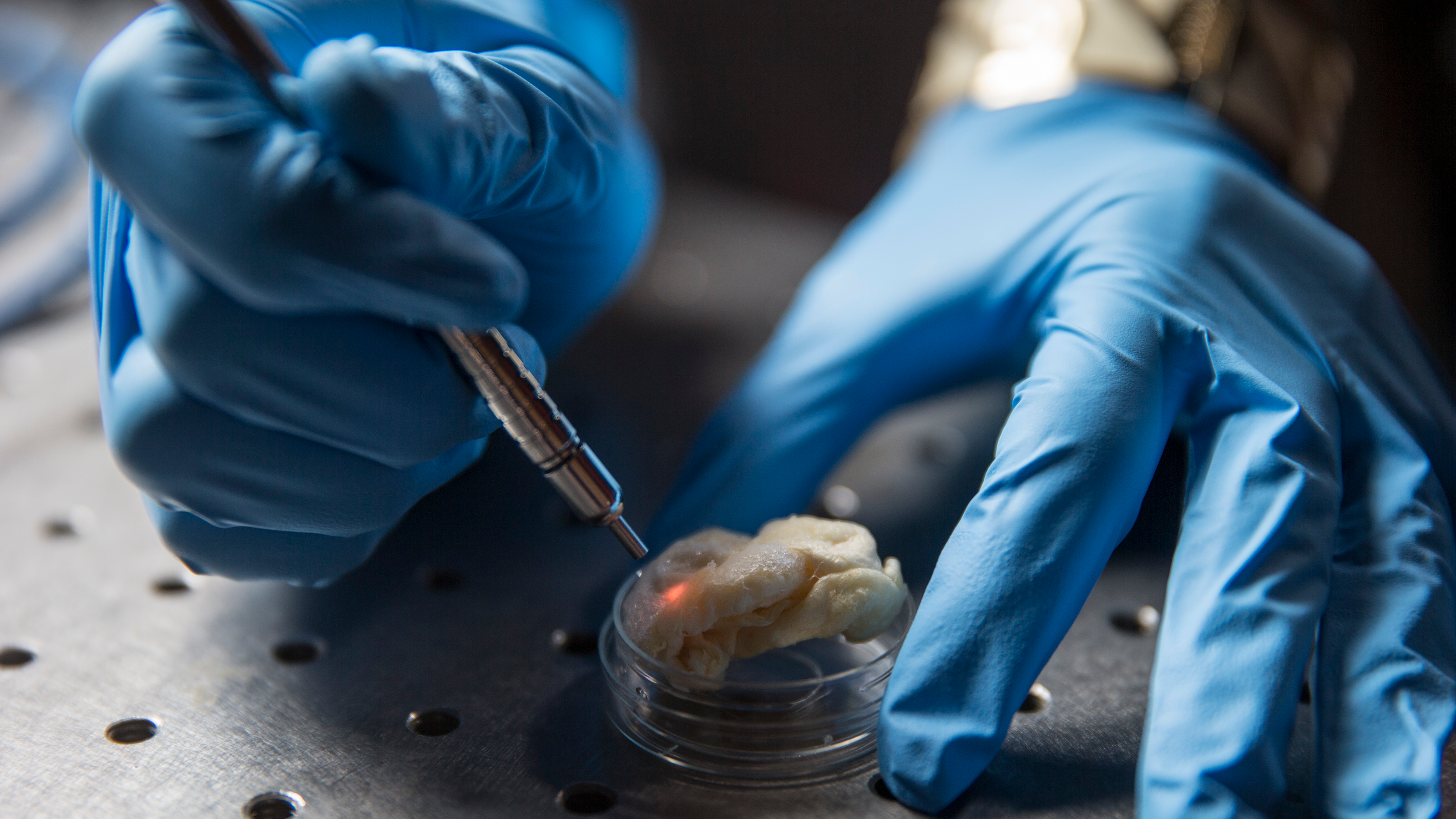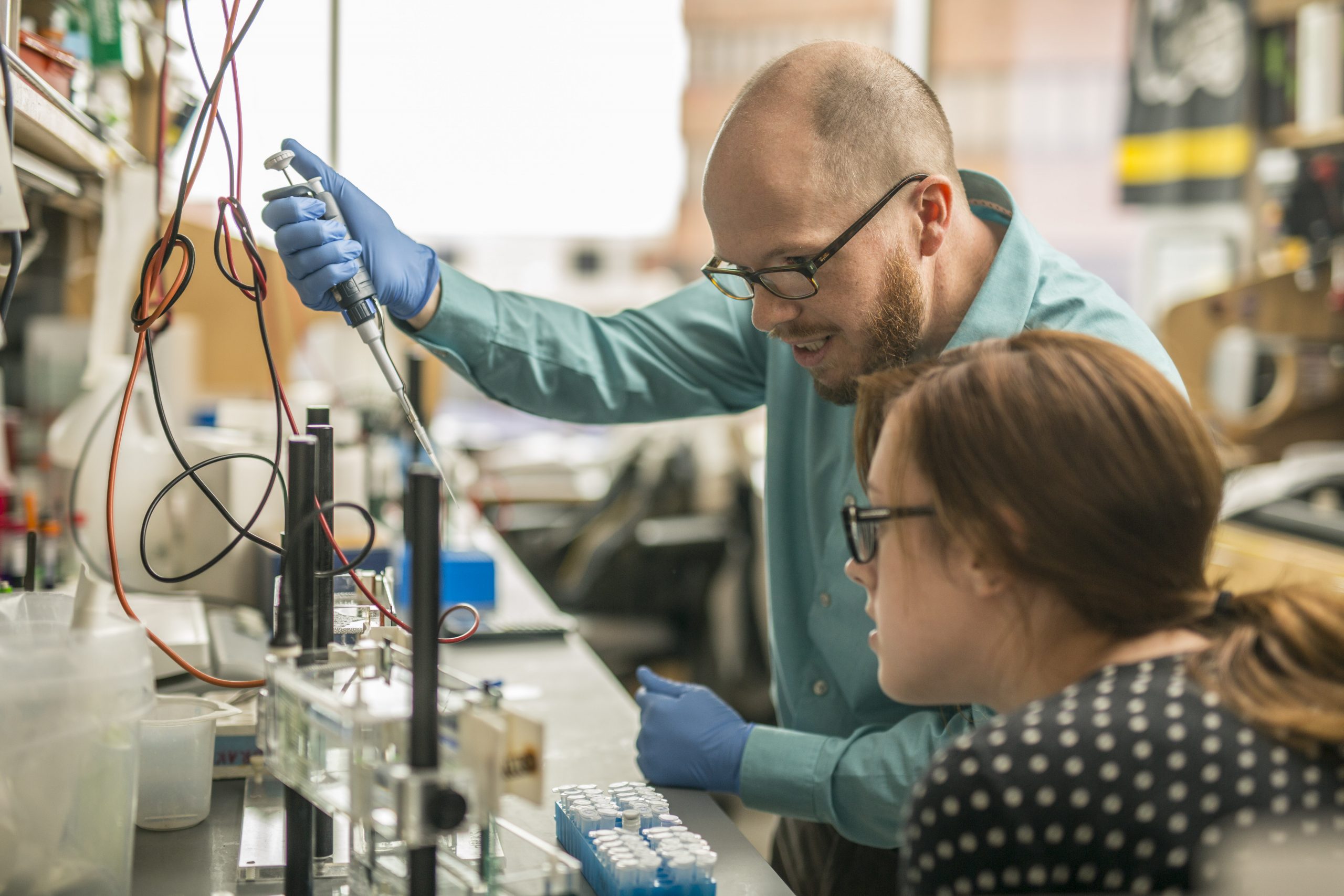Graduate Degree Programs Overview
The purpose of biomedical engineering as a research discipline is to discover new physical and mathematical concepts that are applicable to the problems of biology and medicine, including the organization of health care. Biomedical engineering is concerned with the integrative and mathematical approach to biology and also with more pragmatic problems such as the biomedical use of information systems and the development of advanced biomedical instrumentation.

The Graduate School of Vanderbilt University, in collaboration with the Schools of Engineering and Medicine, offers Master of Engineering, Master of Science; and Doctor of Philosophy degrees with a major in Biomedical Engineering. The goal of the Vanderbilt program is to provide advanced education and research training in quantitative organ and cellular biology, in biomedical information and instrumentation systems, imaging and in the scientific principles underlying the origination of therapeutic devices and processes. It is specifically concerned with the interface between the engineering, physical, computing and mathematical sciences, and biology.
The Department of Biomedical Engineering is in the School of Engineering, but is closely affiliated with the medical school. In addition to the M.Eng., M.S. and Ph.D. degrees, the department also participates in the School of Medicine M.D./Ph.D. program. Many BME faculty members hold joint appointments with the Engineering, A&S, and Medical School departments, and numerous faculty from across campus hold joint appointments in BME. The School of Medicine and Vanderbilt University Medical Center are located on the same campus as the School of Engineering, less than one block away. This close proximity facilitates a wide variety of collaborative efforts between faculty and students in the two schools.
Program Highlights
Graduate Application Deadlines
| Spring admission (MS Program only) | November 1 |
| Fall admission | January 1* |
| Fall admission offers | Early March |
| Deadline to accept admission | Apr. 15 |
* Applications submitted by December 1 will receive priority review with on-campus visit invitations emailed before December 31. Applications submitted by January 1 will be reviewed in early January and on-campus visit invitations will be emailed out in mid-January.
Please make sure to identify faculty you are interested in working with and list them in your Personal Statement.
Doctor of Philosophy
Candidates for the Ph.D. degree must complete a minimum of 27 semester hours of graduate-level didactic courses approved by the program faculty, excluding seminar, research, and teaching hours. Didactic credits cannot be taken on a Pass/Fail grading basis. The credit hours should be distributed as follows:
- Biomedical Engineering: minimum of 15 credit hours (including BME 6110)
- 3 or more credit hour course in life sciences offered at the 6000-level or above, which is taken from the list below or approved by the mentoring committee:
| BME 8901 | Engineering Responses to Global Health Challenge |
| BSCI 6226 | Immunology |
| CANB 8342 | Advanced Concepts in Cancer Biology |
| CBIO 8342 | Epithelial Pathobiology |
| CBIO 8341 | Stem/Progenitor Cell and Regenerative Biology |
| HGEN 8340 | Human Genetics I |
| IGP 8002 | Bioregulation II |
| M&IM 8329 | Principles of Immunology and the Immune System in Disease |
| M&IM 8334 | Special Topics in Molecular Pathogenesis |
| MP&B 8330 | Human Physiology and Molecular Medicine |
| NURO 8327 | Graduate Neuroanatomy |
| NURO 8340 | Fundamentals of Neuroscience II |
| NURO 8345 | Fundamentals of Neuroscience I |
| NURO 8347 | The Visual System |
| PATH-GS 8339 | Foundations of Immunology |
| PATH-GS 8345 | Human Biology and Disease |
| PATH-GS 8351 | Cellular and Molecular Basis of Disease |
- Advanced Engineering/Science: minimum of 9 credit hours
- Of the 27 required didactic credits, at least one course is required to be strongly quantitative. It must either come from the list below or be approved by the mentoring committee.
| BME 7310 | Advanced Computational Modeling and Analysis in BME |
| BME 7410 | Quantitative Methods in Biomedical Engineering |
| BME 7450 | Advanced Quantitative and Functional Imaging |
| CS 5267 | Deep Learning |
| EECE 5356 | Digital Signal Processing |
| CS 8395 | Special Topics Open-Sourcing Programming for Medical Image Processing |
| EECE 6357 | Advanced Imaging Processing |
| EECE 8396 | Special Topics: Analysis of Functional Magnetic Imaging |
| MATH 5670 | Mathematical Data Science |
| MATH 6630 | Nonlinear Optimization |
| MSCI 5009 | Biostatistics I |
| PHYS 8005 | Mathematical Methods for Physicists |
At least 6 of the BME hours and 3 of the advanced science or engineering hours must be 6000+ level courses. The remainder of the 72 hours required for a Ph.D. will primarily consist of dissertation research but may also include seminar and other approved (didactic) courses. In addition, students must pass a qualifying examination consisting of written and oral presentations of a proposal for doctoral research, present a dissertation showing the results of original research in biomedical engineering, and successfully defend the dissertation in an oral examination. The 24 didactic hours taken towards the M.S. degree can be used to count towards the 27 didactic hours required for the Ph.D. degree; however, seminar hours do not count towards the didactic hour requirement for a Ph.D.
Students wishing to combine study for the M.D. degree with that for a Ph.D. in biomedical engineering must apply to the School of Medicine for admission to the Medical Scientist Training Program. Financial aid for this program is available on a competitive basis.
Master of Science
Candidates for the master of science (M.S.) degree must complete 30 hours of graduate-level credit, approved by the faculty, with the following minimum distribution of didactic hours:
- Biomedical Engineering: minimum of 12 credit hours
- 3 or more credit hour course in life sciences offered at the 6000-level or above, which is taken from the list below or approved by the research adviser and Director of Graduate Studies:
| BSCI 6226 | Immunology |
| CANB 8340 | Introduction to Cancer Biology |
| CANB 8342 | Advanced Concepts in Cancer Biology |
| CBIO 8342 | Epithelial Pathobiology |
| CBIO 8341 | Stem/Progenitor Cell and Regenerative Biology |
| HGEN 8340 | Human Genetics I |
| IGP 8002 | Bioregulation II |
| M&IM 8329 | Principles of Immunology and the Immune System in Disease |
| M&IM 8334 | Special Topics in Molecular Pathogenesis |
| MP&B 8330 | Human Physiology and Molecular Medicine |
| NURO 8327 | Graduate Neuroanatomy |
| NURO 8340 | Fundamentals of Neuroscience II |
| NURO 8345 | Fundamentals of Neuroscience I |
| NURO 8347 | The Visual System |
| PATH-GS 8339 | Foundations of Immunology |
| PATH-GS 8345 | Human Biology and Disease |
| PATH-GS 8351 | Cellular and Molecular Basis of Disease |
- Advanced Engineering/Science: minimum of 9 credit hours
At least 6 of the BME hours and 3 of the advanced science or engineering hours must be 6000+ level courses. One (1) hour of BME seminar and 6 hours of thesis research credit hours can count toward the total of 30 hours necessary for the M.S. degree. In addition, the candidate must submit a research thesis for faculty approval and give a final oral presentation.
Master of Engineering
The School of Engineering, in partnership with the Vanderbilt Institute for Surgery and Engineering (VISE), offers a master of engineering (M.Eng.) in Surgery and Intervention. This is a professional degree that targets advanced skillset development for careers in medical technology development. Unlike the thesis-based Master of Science degree, the Master of Engineering is a design-based degree focused on training engineers to develop deep engineering skillsets across biomedical and related disciplines, and to target application of engineering design principles into pressing clinical problems, with particular emphasis on engineering for surgical, interventional, and diagnostic problems within medical practice. This is an advanced professional degree designed for individuals seeking to upskill in medical engineering, experience clinical immersion, and gain career-focused professional engineering skills. The program is appropriate for students coming directly from undergraduate programs, engineers already in professional roles, medical students seeking an integrated second degree (MD-MEng), fifth-year Master's students (BS-MEng), and practicing physicians seeking to become medical innovators. Competitive candidates for the Master of Engineering program typically have prior background in conventional engineering (e.g., biomedical, mechanical, electrical engineering) or related quantitative or technical disciplines (e.g., biophysics, computer science, medicine, etc.).
Graduate Program FAQ
Program Facilities
The Department of Biomedical Engineering at Vanderbilt is unique among biomedical engineering programs in its immediate proximity to the world class Vanderbilt Medical Center, located on our compact campus. Our School of Medicine is among the top ten in funding from the National Institutes of Health and includes a National Cancer Institute-recognized Comprehensive Cancer Center, a major children's hospital and a Level I trauma center. This proximity and the strong relationships among faculty across multiple schools stimulate high impact research and provide unique educational and research and opportunities for students.
The administrative center of BME is centrally located in the Stevenson Center, with many BME laboratories occupying the eighth and ninth floors of Building 5. When possible, laboratories are located near key collaborators. This collaborative environment encourages BME graduate students work in research laboratories across campus, including in other disciplines, such as Living State Physics, Molecular Physiology & Biophysics, Cell Biology, Electrical and Computer Engineering, Pulmonary Medicine, Ophthalmology, Orthopaedics, and Cardiology. Laboratories under direct supervision of BME faculty are described below.
Contact Us
Jonathan Brunger
Director of Graduate Recruiting
Department of Biomedical Engineering
(615) 343-6927
jonathan.m.brunger@vanderbilt.edu
